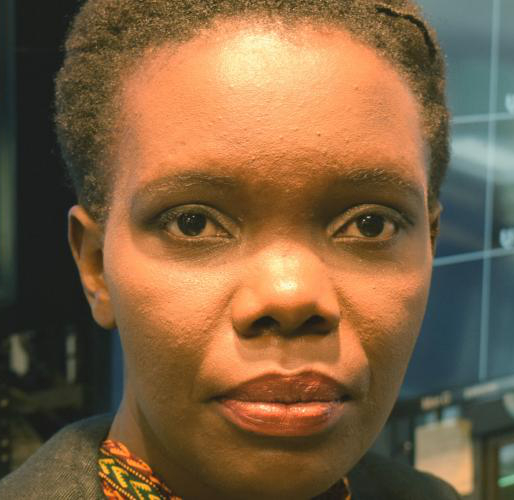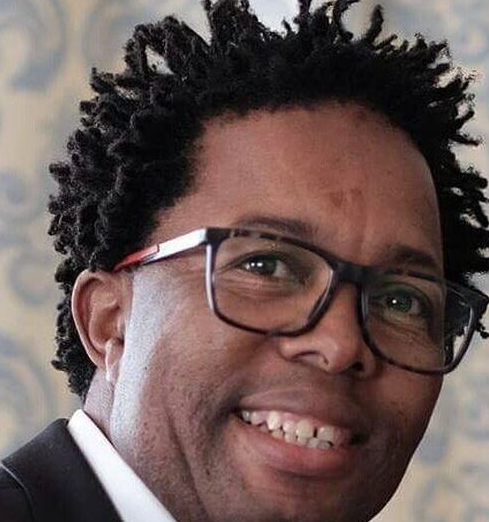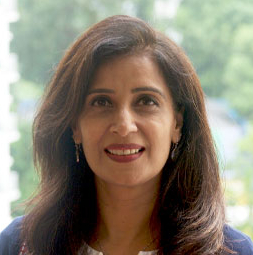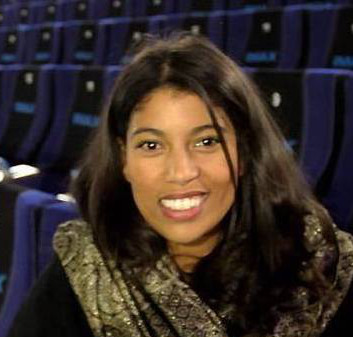Guy Berger
Lack of funding and how to adjust to the digital era are the biggest issues for journalism today, in Africa and across the globe. The very survival of the free press — which is also under intense pressure from conservative governments, fake news and social media — is at stake, but “solutions journalism”, “sustainable journalism” and “slow journalism” may secure the future of African media.
This emerged in a webinar held on 5 May entitled Reclaiming African Journalism in the Public Interest, hosted by Rhodes University’s School of Journalism and Media Studies (JMS), in partnership with multimedia website The Journalist and weekly newspaper the Mail & Guardian, as part of JMS’s year-long celebration of the 50th anniversary of the school.
 Lydia Nambiru
Lydia NambiruThe webinar took place just after World Press Freedom Day 2022 (3 May) and on the last day of UNESCO’s annual World Press Freedom Day Global Conference, which took place from 2 to 5 May, 2022 in Punta del Este, Uruguay. The conference’s theme was Journalism under Digital Threat; it focused on the digital era’s impact on freedom of expression, the safety of journalists, access to information and privacy, and on developing concrete recommendations to address these challenges.
Guy Berger, Director for Policies and Strategies in the field of Communication and Information at UNESCO, joined the webinar from Uruguay. He said that because the digital spyware market is unregulated, journalists and their sources are “really at risk”, but the biggest threat to journalistic digital platforms is the financial issue: “if you can’t pay the bills then there is no free press”. The Covid-19 pandemic brought to crisis point prior trends — for example, between 2009 to 2020, the share of newspapers in global advertising spend fell from 23% to 6%.
Many African governments have also closed down media houses, while others have supported advertising for the “wrong” media, as happened with the ANC and The New Age.
Since the historic 1991 Windhoek Declaration there has been a proliferation of pluralistic African media; there have been many private newspapers and community radio stations, although state-funded media is often the only media most Africans know. But the gains made now lie in tatters; a recent UNESCO report states that 85% of the world’s population has experienced a decline in press freedom in the last few years.
 Jovial Rantao
Jovial RantaoBerger said that because many advertisers have withdrawn their support and donors have declined, there have been many job losses, so media content has degraded. “Journalism is also on the back foot because fake news is often more exciting,” he said. Large media platforms can extract data and mine it, but smaller platforms can’t, so it is difficult for them to attract advertisers and compete. “It is difficult to get e-subscription support for the media in Africa, due to lack of resources.”
One possible remedy is “sustainable journalism”, which complements solutions journalism; it reports on sustainable environmental issues, among others, and this links to audience concerns. It is a useful prism for journalists to utilise, and may help the media to become sustainable itself.
“In order to reclaim African journalism, we have to continue to reinvent it,” said Berger. For example, some media platforms are using WhatsApp to distribute news, but the issue is how to derive income from it, for example by getting people to sign up, which will give them access to special content, or to certain events; or perhaps they could get sponsored content.
Taryn Isaacs De Vega, Rhodes University Lecturer, who moderated the webinar, asked Lydia Nambiru, Journalist and News Editor at The Continent (a weekly online publication in PDF format) the question: “What is African journalism, and when is it in the public interest?” She answered by saying that it very often depends on the moment or context, what the issues are and what the solutions are to particular communities. To reclaim it in the public interest would mean investing in and supporting African newsrooms and employing more journalists, especially women, and journalists who have worked in community radio stations.
Newsrooms have to compete with the market and social media, so they often focus on producing “fast journalism”, but producing content that pays doesn’t always serve the public interest. The Continent’s team of nine decided to “slow down”, because they realised that they had lost the competition with social media for breaking news. Their focus is instead on making sense of the madness, and providing fact-based journalism on the big stories of the week, as well as the stuff that didn’t go viral on social media. “We have built up a community of 17 000 readers; now we just have to monetise it,” she said.
 Kavita Chandran
Kavita ChandranJovial Rantao, Chairperson of the African Editors Forum, said journalism right now is under siege: Covid-19 financial restrictions have led to smaller newsrooms, lower revenues and circulation, and many publications have closed. The pandemic was also used as an excuse by conservative governments to crack down on the media and impose laws that restrict the free press. Artificial intelligence also poses a risk to journalism, as does propaganda and the flood of fake news on social media.
Journalists are under attack from certain governments — 14 journalists were recently arrested in Somalia. Women journalists face many obstacles, such as sexual and online harrasment, rape and even murder. The platform that was launched for the safety of African journalists in 2021 is working really well, as journalists face threats to their lives on a daily basis. We must not forget these brave men and women, said Rantao; the Zondo commission, for instance, was launched largely on the basis of reports from excellent journalists. It is crucial that African journalists keep writing reports that are ethical and fact checked, so that people can use this information without thinking twice about it.
“For the generation of 2022 the survival of the media requires working with partners and stakeholders in the media industry. We must continue to provide information for the public good, without imposing a financial burden on them. We must find new ways to keep our media viable, tell the African story, and find African solutions to African problems, through, for instance, holding discussions such as this webinar.
“It cannot be business and usual; we must find new ways to address our problems, which are practical and implementable. African media is being called upon to change its business model, so that it can survive and the African story can be told,” said Rantao.
Kavita Chandran, Journalist and Media Trainer at the Thomson Reuters Foundation, said that “solutions journalism” has become important in an era of “news fatigue” — many people feel helpless and don’t know how to respond to the news, so they avoid reading or listening to it. There is an erosion of public trust in both politicians and the news media. Chandran said that this is because traditionally journalists were taught to cover “issues” (if it bleeds it leads) and expose wrongdoing, but this results in a lot of people not reading the news at all.
 Taryn Isaacs De Vega
Taryn Isaacs De VegaSolutions journalism looks at effectiveness (not just good intentions — it is not “sunshine journalism”), provides evidence of how results were produced, spotlights adaptive responses, how they work, and what can be learned from the efforts of others. It produces insights and discusses the limitations of approaches. For example, Guardian Columnist Afua Hirsch wrote a story about why African Covid-19 success stories are being overlooked, to counteract the widespread perception that Africa only produces “negative” news.
Rantao said the African Editors Forum is working on helping the media in Africa to remain viable: “You need to be able to pay journalists, and you also need to retrain them so that they write for African audiences. For instance, many of the world’s fastest-growing economies are here in Africa, so we need to tell the story of the people behind this. The forum is working on the idea of an African media diversity fund, to keep African media afloat; and perhaps we need some big investors to train journalists to become entrepreneurs.”
This idea was also shared by Berger, who said that perhaps Africans should demand a special fund for digital transformation and digital start-ups in media. “Such funds would have to be independent and transparent, so that they don’t get abused,” he added.
Chandran said that to stay abreast of new trends, journalists have to ask: “What does the younger generation want, and how do you understand that? What is their understanding of authenticity, and how can you upskill to address that?” Newspapers also have to go local, and explain things better, so that people can relate, for viable and sustainable journalism.
Zubeida Jaffer, who serves on the 50th Anniversary Committee of the JMS School, said that African journalists need to work together to solve their problems. “On our own we are fractured and won’t be effective. We are hoping to use the 50th anniversary of Rhodes journalism as a way to create a network, to keep having these kinds of discussions and find our way forward.”
De Vega concluded by saying that the JMS anniversary will include a series of interventions, such as workshops and training sessions. For more details visit www.JMS50.ru.ac.za
The webinar can be accessed here: https://drive.google.com/drive/u/0/folders/1CVWNIAFrl4bKgWd-Goi7BOSYWLhx-oTc
Access passcode: *p.3=!?a
— Derek Davey